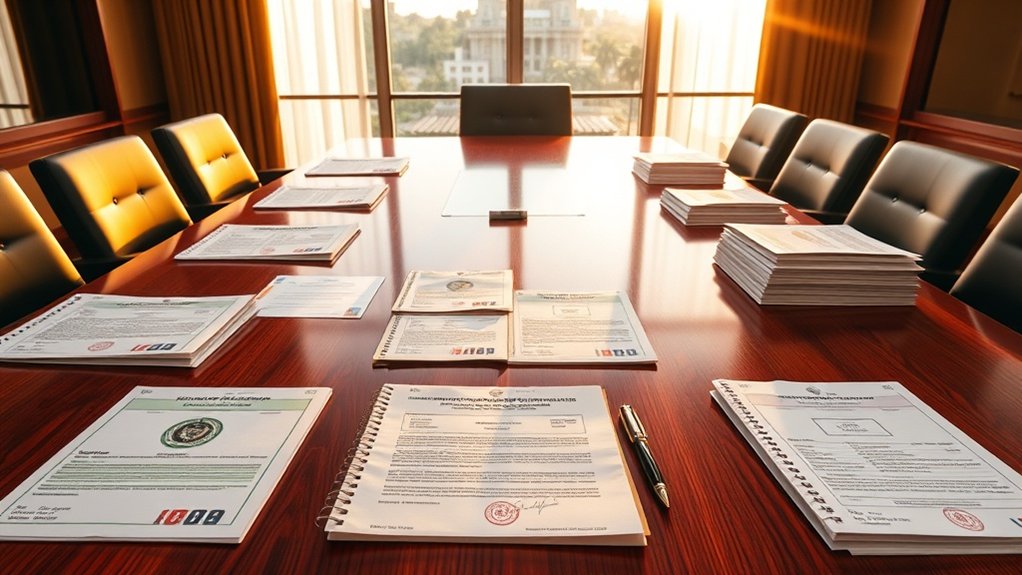You’re navigating Brazil’s complex legal landscape as a remote worker, and you’ve likely discovered that immigration and tax requirements don’t operate in isolation. When you’re dealing with visa applications while simultaneously managing tax residency obligations, misaligned strategies can create costly compliance issues that derail your plans. Vieira Braga Advogados has developed a systematic approach that synchronizes these critical processes, but the coordination required goes far beyond what most professionals anticipate.
Understanding the Interconnection Between Tax Residency and Visa Requirements

When you’re considering Brazil as your remote work destination, you’ll quickly discover that tax residency and visa requirements operate as interconnected systems that directly impact your legal status and financial obligations.
Your visa type determines your permitted stay duration, which triggers tax residency rules. If you remain in Brazil for 183 days within a 12-month period, you’ll become a tax resident regardless of your visa status. This creates immediate obligations to report worldwide income to Brazilian authorities.
Different visa categories offer varying flexibility levels. Tourist visas restrict your stay to 90 days, preventing tax residency triggers. Temporary visas allow longer periods but require careful day-counting to avoid unintended tax consequences.
You can’t separate these decisions – your immigration strategy must align with your tax planning. Missteps in either area create compliance issues that compound over time. Understanding this relationship upfront prevents costly corrections later and ensures your Brazilian remote work arrangement remains legally sound.
Similar principles apply when considering U.S. immigration, where non-immigrant visas for temporary work arrangements must be carefully coordinated with tax obligations and residency requirements.
Strategic Planning for Digital Nomad Visa Applications and Tax Optimization
Since Brazil’s digital nomad visa framework continues evolving, you’ll need a proactive approach that positions your application for approval while minimizing tax exposure.
Your strategic planning should synchronize visa timing with tax residency implications. Vieira Braga Advogados develops integrated roadmaps that address both immigration compliance and tax optimization simultaneously.
| Planning Phase | Immigration Focus | Tax Consideration |
|---|---|---|
| Pre-Application | Document preparation, income verification | Establish foreign tax residency status |
| Application Period | Visa submission, government communication | Monitor 183-day presence rule |
| Approval Phase | Entry logistics, registration requirements | Structure income sources optimally |
| Post-Arrival | Compliance maintenance, renewals | Ongoing tax obligation management |
You’ll want to coordinate your entry date with your global tax calendar, ensuring you don’t inadvertently trigger Brazilian tax residency before optimizing your income structure. Professional guidance helps you navigate renewal requirements while maintaining favorable tax positioning throughout your stay.
Simple mistakes in documentation or timing can result in application denials or unnecessary delays that disrupt both your immigration timeline and tax planning strategy.
Coordinated Documentation Process for Immigration and Tax Compliance

While your digital nomad visa application requires specific immigration documents, you’ll simultaneously need to prepare tax-related paperwork that supports your compliance strategy. Vieira Braga Advogados coordinates both processes to prevent duplicated efforts and ensure consistency across all submissions.
You’ll need proof of income, employment contracts, and bank statements for immigration purposes. These same documents become foundational for establishing your tax residence status and income reporting obligations. We’ll help you structure these materials to satisfy both requirements simultaneously.
Your criminal background checks and health certificates support visa approval while establishing your legal standing for tax purposes. We’ll ensure your financial documentation demonstrates sufficient income for visa requirements while positioning you optimally under Brazil’s tax treaties.
This coordinated approach eliminates conflicting information between agencies and reduces processing delays. You’ll submit comprehensive documentation packages that strengthen both your immigration case and tax compliance position, creating a seamless transition into Brazilian residency. Professional legal guidance prevents incorrect form filling and incomplete documentation that could jeopardize both your immigration status and tax compliance obligations.
Managing Ongoing Obligations Across Both Legal Frameworks
After securing your digital nomad visa and establishing tax compliance, you’ll face ongoing responsibilities that span both immigration and tax frameworks. You must maintain valid documentation for both systems simultaneously, ensuring your visa status remains current while meeting Brazilian tax obligations.
Your immigration duties include timely visa renewals, address updates with Federal Police, and maintaining proof of remote work arrangements. You can’t let either status lapse without affecting the other.
Tax obligations continue monthly or annually, depending on your income structure. You’ll file regular returns, pay applicable taxes, and maintain detailed records of Brazilian-sourced versus foreign income. Currency fluctuations impact your tax calculations, requiring consistent monitoring.
Vieira Braga Advogados coordinates these parallel timelines, tracking renewal dates, tax deadlines, and documentation requirements. We ensure you’re never caught between conflicting obligations or missed deadlines that could jeopardize your legal status in Brazil. Professional legal compliance guidance becomes essential as immigration laws constantly evolve and any errors in managing these interconnected obligations can lead to visa denials or deportation.
Avoiding Common Pitfalls Through Synchronized Legal Strategies

When you navigate Brazil’s dual immigration and tax requirements independently, you’re likely to encounter preventable complications that could disrupt your remote work status. Most remote workers make critical errors by treating immigration and tax obligations as separate processes instead of recognizing their interconnected nature.
Here are the most damaging mistakes you can avoid:
- Timing misalignment – Filing tax declarations before securing proper visa status or vice versa
- Income reporting inconsistencies – Declaring different amounts to immigration versus tax authorities
- Documentation gaps – Missing required paperwork that satisfies both legal frameworks simultaneously
- Residency assumption errors – Misunderstanding how your physical presence affects both tax liability and visa compliance
You’ll protect your remote work arrangement by coordinating these processes from the start. When immigration applications align with tax planning strategies, you’ll avoid contradictory filings that trigger government scrutiny. This synchronized approach prevents costly corrections and maintains your legal standing across both systems. Specialized legal assistance significantly increases your chances of successfully navigating both immigration and tax requirements without encountering delays or denials that could jeopardize your remote work status.
Frequently Asked Questions
What Are Vieira Braga Advogados’ Typical Fees for Combined Tax and Immigration Services?
You’ll need to contact Vieira Braga Advogados directly for specific pricing on their combined tax and immigration services. They don’t publish standard fee schedules since costs depend on your individual circumstances, visa type, tax complexity, and service scope. Most immigration law firms charge hourly rates or flat fees per service, but you’ll get accurate pricing only through a consultation where they’ll assess your particular remote work situation and requirements.
How Long Does the Entire Process Usually Take From Start to Finish?
You’ll typically see the entire process take 3-6 months from start to finish. Your immigration visa application usually requires 60-90 days for processing, while tax registration and CPF setup can happen within 2-4 weeks. However, you’ll find timing depends on your specific situation, document complexity, and current government processing speeds. Vieira Braga coordinates both tracks simultaneously to minimize delays and keep you on schedule.
Does Vieira Braga Advogados Offer Services in English for International Clients?
Yes, Vieira Braga Advogados provides services in English for international clients. You’ll find their team can communicate effectively in English throughout your tax and immigration process in Brazil. They understand you’re navigating complex Brazilian regulations from abroad, so they’ve structured their services to accommodate English-speaking remote workers. You won’t face language barriers when discussing your legal requirements, documentation, or compliance matters with their attorneys.
Can the Firm Help With Tax Obligations in My Home Country?
While Vieira Braga Advogados specializes in Brazilian tax and immigration law, they can’t directly handle your home country’s tax obligations since they’re not licensed to practice law there. However, they’ll coordinate with international tax professionals and guide you through cross-border tax implications. They’ll help you understand how your Brazilian tax status affects your home country obligations and connect you with qualified professionals in your jurisdiction when needed.
What Happens if My Visa Application Gets Rejected After Tax Planning?
If your visa application gets rejected after tax planning, you won’t face immediate tax consequences since you haven’t established Brazilian tax residency yet. However, you’ll need to reassess your situation quickly. The firm can help you appeal the decision, explore alternative visa options, or adjust your tax strategy if you decide to pursue residency in a different country instead of Brazil.
Conclusion
You’ll find that successfully managing your remote work journey in Brazil requires precise coordination between immigration and tax strategies. By synchronizing your visa applications with tax residency planning, you’re protecting yourself from costly compliance errors and maximizing your financial benefits. Don’t navigate these complex legal frameworks alone—you need expert guidance to ensure your documentation aligns properly and your obligations remain manageable throughout your stay.




